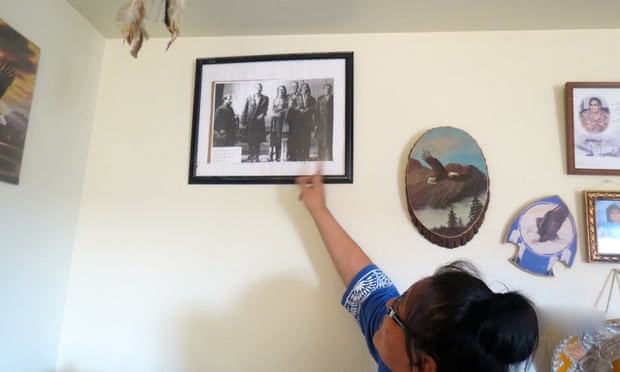'We get the kids back': Native American grandmother fights to preserve families
In South Dakota, 51% of children in foster care are Native American
but one woman turned de facto legal counselor is using the law to change
that
 |
| Janice Howe at home, showing family pictures. The South Dakota grandmother turned her outrage into a mission to help families on reservations know their rights. Photograph: Sue Purchase |
Sitting on the quiet plains of South Dakota,
the Crow Creek reservation is buried in snow. Janice Howe’s tiny home,
nested in a sparse enclave of houses, is a warm haven against the winter
chill. She slips bits of dough into a sizzling pan as her granddaughter
and nieces joyously chase one another. As the girls tumble over one
another, Howe talks about her work: her role is to bring Native American
children back to the reservation. They were, she says, stolen by the
state – and the story starts with her own family.
“They take children away [from families] because there’s no food in the house so I find a way to help them get food, keep their lights on, get their rent paid,” she says. “I remember that heartache. I don’t want any other families to go through that.”
The former public health nurse is still outraged about the day, five years ago, representatives from the state’s department of social services (DSS) showed up on her daughter’s doorstep without warning and hauled her grandkids away. Howe says the allegations of neglect were flimsy, and ultimately unsubstantiated. By placing her grandchildren in state foster homes outside the tribe, DSS also violated Howe’s rights under the Indian child welfare act (ICWA), a federal law that is supposed to protect children of Native American tribes from state interventions and removals.
That law, experts say, is a way to shield native families from allegations of neglect based on poverty. It reads:
“Is very comforting to know that there are others who have walked down this path in regards to our children,” posts Brenda Charger, a Lakota grandmother from Pierre, South Dakota. “So thankful to have found this group helps to know that I am not alone in this deal. Wopila, ladies!”
“They take children away [from families] because there’s no food in the house so I find a way to help them get food, keep their lights on, get their rent paid,” she says. “I remember that heartache. I don’t want any other families to go through that.”
The former public health nurse is still outraged about the day, five years ago, representatives from the state’s department of social services (DSS) showed up on her daughter’s doorstep without warning and hauled her grandkids away. Howe says the allegations of neglect were flimsy, and ultimately unsubstantiated. By placing her grandchildren in state foster homes outside the tribe, DSS also violated Howe’s rights under the Indian child welfare act (ICWA), a federal law that is supposed to protect children of Native American tribes from state interventions and removals.
That law, experts say, is a way to shield native families from allegations of neglect based on poverty. It reads:
In judging the fitness of a particular family, many social workers, ignorant of Indian cultural values and social norms, make decisions that are wholly inappropriate in the context of Indian family life and so they frequently discover neglect or abandonment where none exists.It took 21 months for Howe to get her grandchildren back – enough time for her to study and use the act to her advantage by transferring her case to a tribal court. Afterward, she started a support group on Facebook for Native American mothers and grandmothers who are fighting their state courts for custody of their children.
“Is very comforting to know that there are others who have walked down this path in regards to our children,” posts Brenda Charger, a Lakota grandmother from Pierre, South Dakota. “So thankful to have found this group helps to know that I am not alone in this deal. Wopila, ladies!”























No comments:
Post a Comment
Please: Share your reaction, your thoughts, and your opinions. Be passionate, be unapologetic. Offensive remarks will not be published. We are getting more and more spam. Comments will be monitored.
Use the comment form at the bottom of this website which is private and sent direct to Trace.